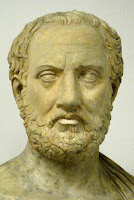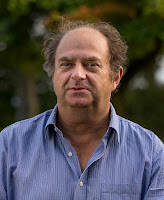“A primary complaint here [Hollywood] is overpopulation; old-guard natives tell me the terrain is bulging with ‘undesirable’ elements, hordes of ex-soldiers, workers who moved here during the war, and those spiritual Okies, the young and footloose; yet walking around I sometimes have the feeling of one who awakened some eerie morning into a hushed, deserted world where overnight, like sailors aboard the Marie Celeste, all souls had disappeared. There is an air of Sunday vacancy; here where no one walks cars glide in a constant shiny silent stream, my shadow, moving down the stark white street, is like the one living element of a Chirico. It is not the comfortable silence felt in small American towns, though the physical atmosphere of stoops and yards and hedges is very often the same; the difference is that in real small towns you can be pretty sure what sorts of people there are hiding beyond those numbered doors, but here, where all seems transient, ephemeral, there is no general pattern to the population, and nothing is intended—this street, that house, mushrooms of accident, and a crack in the wall, which might somewhere else have charm, only strikes an ugly note prophesying doom.” —American fiction writer and essayist Truman Capote (1924-1984), “Hollywood” (1947), republished in Portraits and Observations: The Essays of Truman Capote (2007)
The pursuit of fame can bring the unwary to a desolate
place—a lesson that Truman Capote, born 100 years ago today in New Orleans,
learned firsthand but, to his loss and literature’s, managed to forget.
When I considered my choices for a post commemorating Capote’s
centennial, I thought of either a quote from his own work, giving a taste of
his impeccable writing style, or one from someone else about the author of In
Cold Blood. Rather than choose one to the exclusion of the other, I decided
to take both.
The paragraph opening this post is an example of the
first option; the following, from an April 1988 Esquire essay by
his Hamptons neighbor, A Separate Peace novelist John Knowles, of the
second:
“Truman Capote really was alone, and he knew it. No
one anywhere on earth can have looked like him, with his odd Pekingese
features, or above all sounded like him when he spoke. This very short,
thick-legged person with his big head and yellow, later gray bangs, speaking in
a tissue-paper thin, whiny lisp, was not at all like anybody else. Clothes were
not manufactured that fit him; no voice anywhere echoed his. When he would
merely enter a room or utter a few words, strangers stopped short, jerked their
heads around to behold him, usually—until he became so famous—with at least a
tinge of mockery, or hostility.”
Few writers have so adeptly captured Capote’s oddness,
vulnerability, and sense of remove better than Knowles—or how, “as a form of
self-protection, Truman made himself the only writer in the world after Ernest
Hemingway whom the man in the street recognized on sight.”
The name of the other author that Knowles drops in
that sentence is a signal of what’s to come: a writer who, believing he wears “the
invisible, protective shield of celebrity,” instead falls victim to his
self-created legend.
By the mid-1960s, it was hard to miss Capote and his work,
with adaptations not only of In Cold Blood but also Breakfast at
Tiffany’s, and, for television, A Christmas Memory and The
Thanksgiving Visitor. And, of course, there was the masked “Black and White
Ball” that Capote ostensibly threw for Washington Post publisher Katharine
Graham, but which also, not so coincidentally, raised his own profile.
A decade later, something was amiss. Most observers
trace Capote’s decline to his disastrous publication of the “La Côte Basque
1965” chapter of his projected roman a clef, Answered Prayers.
But the ostracism that Capote suffered at the hands of
the high-society “swans” he betrayed only accelerated deterioration that had
set in already, in much the same way that two plane crashes only a day apart that
Hemingway survived in 1954 marked the point of no return for a creative and
psychological degeneration previously in motion.
There were distractions aplenty that Capote didn’t need in the Seventies:
*a 1978 appearance on the egregious Gong Show imitation, The Cheap Show;
*his feature-film debut as an
actor, Murder by Death, which was so disastrous that screenwriter spent
virtually the entire production unsuccessfully pressing to have him replaced by
"any actual member of the Screen Actors Guild";
*his frequent presence as a guest on The Tonight Show; and
*a 1978 interview with Stanley Siegel that turned so rambling, incoherent and disastrous that the morning talk-show host asked on the air if the author was "feeling all right."
As with Hemingway, while the discipline of sitting
down at a typewriter remained intact for Capote, an essential creative skill
had been dulled by the years of substance abuse: the creative faculty that
would enable him to detect and fix what was wrong with a day’s work and push it
to completion.
Nearly four decades after Capote journeyed to
Hollywood, he met his end there in the home of one of its denizens: one of the
few female friends not to desert him in the wake of Answered Prayers,
Johnny Carson’s ex-wife Joanne.
For most of his career, Capote’s work was a model for how
to write. His death was a model for how to squander a writer’s capacity.
Or, as Knowles concluded in his poignant reminiscence:
“The autopsy found the failure of various organs, but I knew that he had died
because he had used up all of the things he had ever lived for.”
.jpg)













.jpg)


















